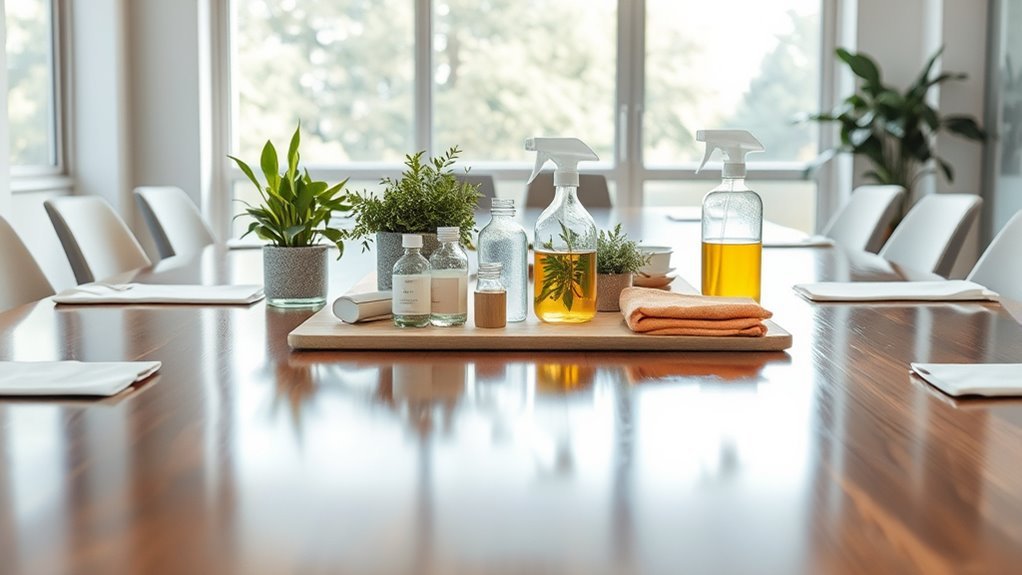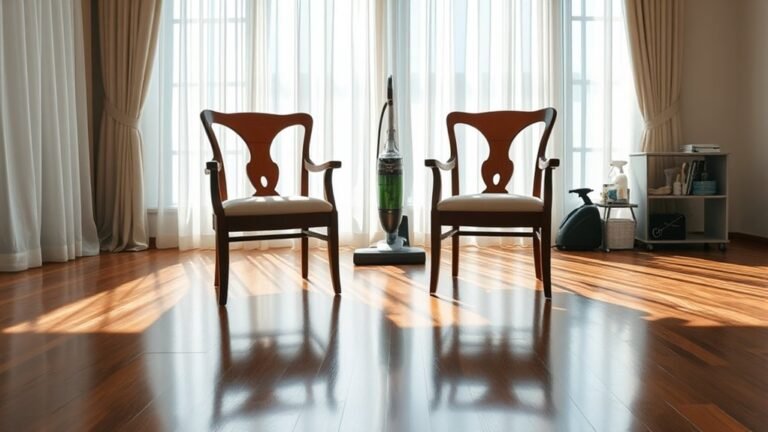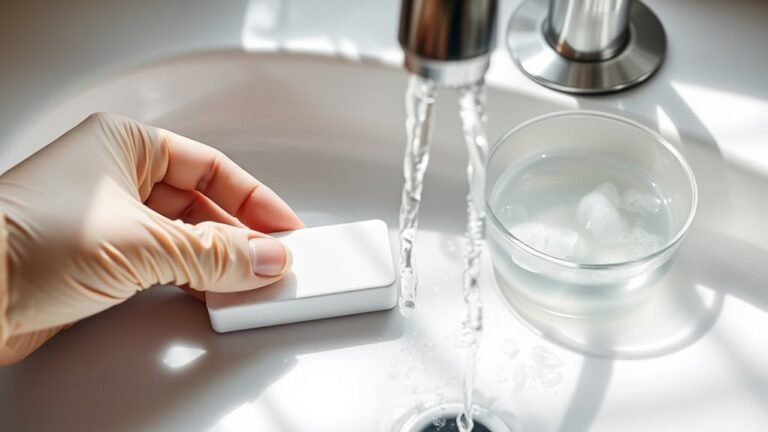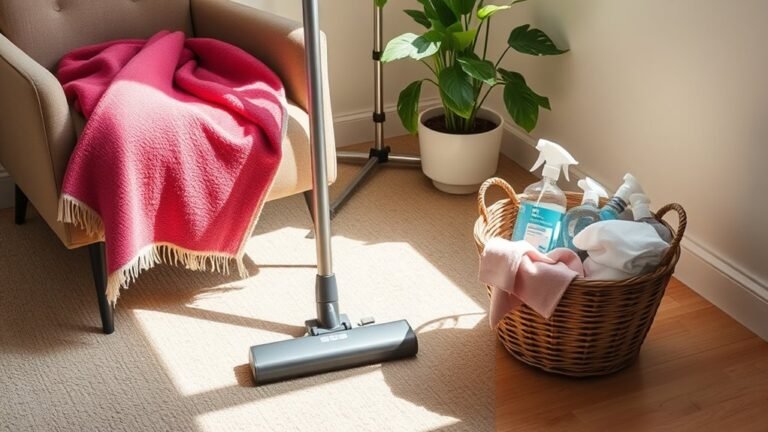Natural Cleaning Hacks for Your Conference Table
You can keep your conference table clean and fresh using natural ingredients like vinegar, baking soda, and olive oil. Start by dusting with a soft cloth, then wipe down with a mild vinegar-water solution to remove grime without damage. Use baking soda to tackle sticky residue and neutralize odors, while a mix of olive oil and lemon juice adds shine and protection. With these simple hacks, your table stays spotless and well-maintained—explore further for detailed steps and tips.
Essential Natural Ingredients for Effective Cleaning
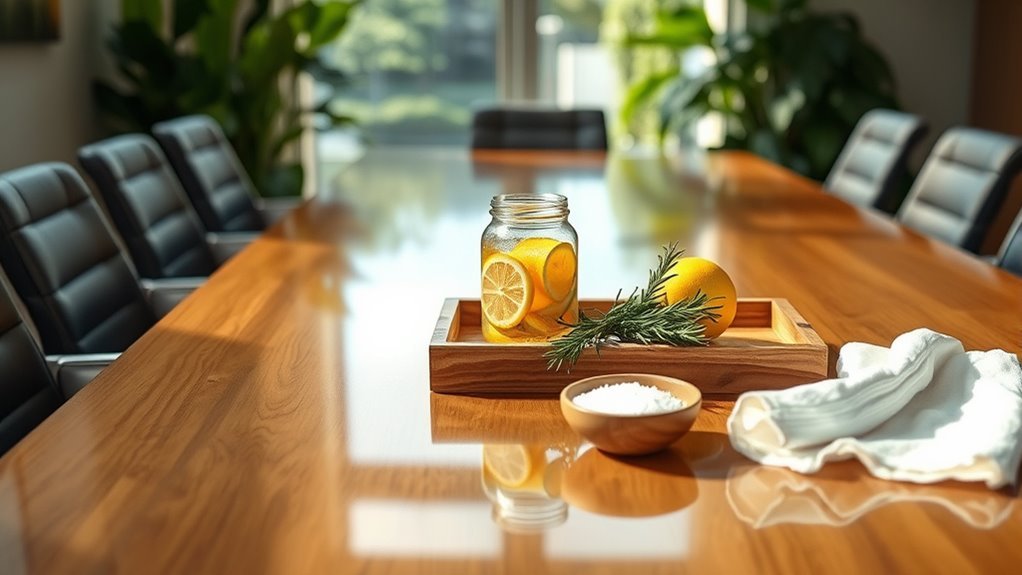
Although you might think effective cleaning requires harsh chemicals, several natural ingredients can get the job done just as well. You’ll find a vinegar solution invaluable; it’s a powerful disinfectant and deodorizer that effortlessly cuts through grime without leaving toxic residues. Pairing vinegar with water creates a versatile cleaner suitable for most surfaces. Baking soda is another essential ingredient you should keep on hand. It acts as a mild abrasive, perfect for scrubbing away stubborn stains and neutralizing odors. When combined, these two ingredients provide a safe, eco-friendly alternative to traditional cleaners, giving you the freedom to maintain your space without compromising health or the environment. By mastering these basics, you’re equipped to tackle a variety of cleaning tasks naturally and effectively.
Step-by-Step Guide to Cleaning Wood Conference Tables
Cleaning wood conference tables requires a careful approach to preserve their finish while removing dirt and grime. Start by dusting with a soft cloth to prevent scratches. Use a mild solution of water and natural soap for wiping, avoiding excess moisture. Follow with a dry cloth to prevent water damage. Maintain a regular cleaning frequency—ideally weekly—to keep your table looking fresh and extend its lifespan. For wood care, apply a natural oil polish monthly to nourish and protect the surface.
| Step | Action |
|---|---|
| Dusting | Use a soft, dry cloth |
| Cleaning | Wipe with mild soap and damp cloth |
| Finishing Touch | Dry immediately and apply natural oil |
Stick to this routine for a clean, durable conference table.
Removing Stains and Sticky Residue Naturally

Maintaining your wood conference table means more than just regular dusting and polishing—it also involves tackling stubborn stains and sticky residues that can build up over time. For effective stain removal, start by applying a mixture of equal parts white vinegar and water to a soft cloth, gently rubbing the affected area. This solution breaks down stains without harsh chemicals, preserving your table’s finish. To remove sticky residue, sprinkle baking soda on a damp cloth and rub the spot in a circular motion; this naturally loosens adhesive without scratching the wood. Always test these methods on a hidden area first. By using these natural techniques, you keep your conference table spotless and extend its life, all while avoiding toxic substances and maintaining your workspace’s freedom and cleanliness.
Deodorizing Your Conference Table Without Chemicals
When you want to keep your conference table smelling fresh without relying on chemicals, natural deodorizing methods offer a safe and effective solution. Using natural air fresheners like essential oils and vinegar solutions can neutralize odors and create a welcoming environment. Here’s a quick reference to help you choose the right method:
| Method | Ingredients | Benefits |
|---|---|---|
| Vinegar Solution | White vinegar + water | Neutralizes odors |
| Citrus Spritz | Lemon or orange peel + water | Invigorating scent |
| Baking Soda Dust | Baking soda | Absorbs moisture & smells |
| Essential Oils | Lavender, eucalyptus | Long-lasting fragrance |
| Coffee Grounds | Used coffee grounds | Natural odor absorber |
Try these simple, chemical-free options to maintain a fresh conference space effortlessly.
Maintaining Shine and Protecting the Surface Naturally
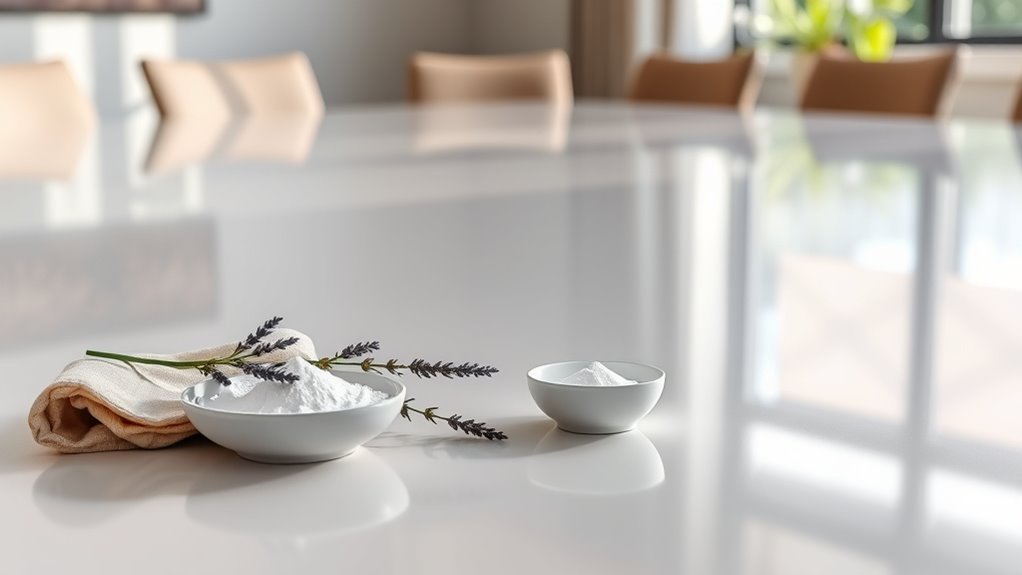
Keeping your conference table fresh is just one part of its care. To maintain shine and protect the surface naturally, focus on consistent surface care using gentle, effective methods. Avoid harsh chemicals that can damage finishes over time. Instead, create a natural polish by mixing equal parts olive oil and lemon juice. Apply a small amount with a soft cloth, rubbing in circular motions to restore luster and provide a protective layer. This natural polish nourishes the wood while repelling dust and moisture, extending your table’s lifespan. Regularly dusting with a microfiber cloth also prevents buildup that dulls the finish. By embracing these simple, natural techniques, you preserve your conference table’s beauty and durability, giving you the freedom to enjoy a pristine workspace without compromise.
Frequently Asked Questions
Can Natural Cleaning Harm Electronic Devices on the Table?
You might worry if natural cleaning solutions could harm your electronic devices, but with proper care, they won’t. The key is to avoid spraying liquids directly onto electronics and to use a slightly damp cloth instead. Prioritizing electronic safety keeps your devices protected while you enjoy the benefits of natural cleaners. So, you can confidently maintain cleanliness without risking damage, giving you freedom from harsh chemicals and device concerns.
How Often Should I Deep Clean My Conference Table Naturally?
You should perform weekly maintenance to keep your conference table looking its best and avoid buildup. For deep cleaning, aim for a thorough natural cleanse every one to two months, depending on usage. Adjust the cleaning frequency based on how often the table’s used and the types of spills or dirt it encounters. Staying consistent with this routine helps maintain a fresh, inviting workspace without overdoing it.
Are Natural Cleaning Hacks Safe for All Wood Finishes?
Imagine you’ve used vinegar on a delicate wood finish, and it left a dull spot. That’s why wood finish compatibility matters when choosing natural cleaners. Not all finishes react well, so testing on a hidden area first is smart. Natural cleaner effectiveness varies—some work great on sealed surfaces but can damage unfinished wood. You want to maintain your table’s look without restrictions, so always match your cleaner to the finish type for safe, effective results.
Can These Natural Methods Eliminate Mold or Mildew?
You can effectively tackle mold removal using natural methods like vinegar or tea tree oil, which are powerful yet gentle. These solutions not only eliminate mold but also aid in mildew prevention by creating an inhospitable environment for fungal growth. Just remember to apply them regularly and allow proper ventilation to keep your space fresh. This way, you maintain a clean, healthy environment without relying on harsh chemicals.
What Natural Alternatives Exist for Polishing Metal Table Accents?
Think of your metal accents as hidden stars waiting to shine. You can awaken their brilliance naturally by crafting a vinegar solution—mix equal parts vinegar and water—to gently dissolve tarnish. For stubborn spots, create a paste with baking soda and water, then rub it softly onto the metal. Rinse and buff with a soft cloth, and you’ll set those accents free, sparkling with a fresh, unrestrained glow.
